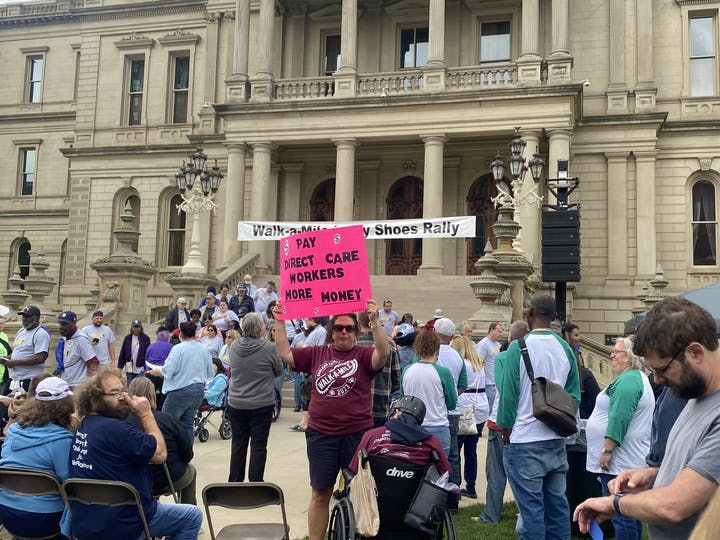On Sept. 13 from 12 p.m. to 3 p.m., around 2,000 Michigan citizens surrounded the Michigan Capitol for the “Walk a Mile in My Shoes” rally to bring more attention to mental and public health and wellness. The main organization that held this rally was the Community Mental Health Association of Michigan, or CMHA, with different associated organizations representing each county in Michigan.
The rally gave voices to people sharing their personal experiences, those who have been impacted by the use of community behavioral health services and people who wanted to come out and share their support for this cause.
CMHA associate director Alan Bolter has been working with the association since 2009 and works on advocacy, public policy and policy lobbying. According to Bolter, CMHA represents Michigan’s public mental health system, which includes the 46 community mental health agencies plus 10 prepaid, inpatient behavioral health plans.
To him, this rally is extremely important for people who believe in this issue and want to make it more publicized, creating a difference in the future.
“It’s a rally about people that are served, people that are impacted with mental illness, to stand up against the stigma that many individuals with mental illness face on a day-to-day basis,” Bolter said. “We’re just like everybody else: your neighbors, your family, your friends.”
The first goal that CMHA hopes to achieve is to enhance public awareness and educate legislators about why mental health matters. CMHA and Bolter hope to inform voters and lawmakers of the public behavioral health system and areas that need enhancement, such as access to services, integrated healthcare and workforce recruitment and retention.
Ingham County Clerk Barbara Byrum attended the rally to not only support what the organizations were doing, but to also make sure that the attendees were up to date with voting information.
“I’m here because this is a gathering of a bunch of people who are likely qualified to register to vote, so I want to make sure that they have the necessary information to register to vote, the opportunity to update their voter registration and answer any questions they may have,” Byrum said.
The population of Michigan is 10 million and the population that can vote is roughly 8 million. But in 2020, only 5,579,317 people voted. So, can a better voter turnout, especially with the help of Byrum, in the aftermath of this rally help educate legislators about why mental health matters and actually create change?
That is CMHA’s goal; but to understand their goals better, let’s look at historical problems within Michigan and their public health issues.
According to the National Alliance of Mental Illness, or NAMI, 1,469,000 adults in Michigan have a mental health condition. And with that, more than half of people with a mental health condition in the U.S. did not receive any treatment in the last year, mainly due to cost or how unaccessible getting help was. In May 2022, 27.8% of Michigan adults reported experiencing symptoms of anxiety and/or depressive disorder who had an unmet need for counseling or therapy.
Chelsea Oliver is the Public Relations Strategist at LifeWays, the community mental health organization designated to support Jackson County and Hillsdale County. Oliver has been with LifeWays for three years and a different mental health organization for two years before that. To her, the stigma that people receive is one of the reasons why they are not getting the help that they need.
“One of the biggest barriers for people accessing care, specifically mental health care services, is the stigma around mental health care services, and people thinking that it’s something to be ashamed of or that they are scared to approach or talk about their mental health,” Oliver said. “The more we talk about it, the more we have big events where there are thousands of people, and the more people feel comfortable talking about it, and it breaks down that barrier to accessing that mental health care.”
Oliver said ending the stigma can and hopefully will bring change from legislators to actually make a difference in all of the counties in Michigan, offering a plethora of resources to adults and children.
Two of the most prevalent mental health issues in the U.S., and specifically in Michigan, are depression and anxiety. According to NAMI, 57.8% of Michiganders aged 12-17 who have depression did not receive any care in the last year. On the other hand, as of Feb. 2023, 29.9% of adults in Michigan reported symptoms of anxiety and/or depressive disorder, compared to 32.3% of adults in the U.S.
Although anxiety and depression are more common in Michiganders, there is one other mental and public health issue that affects a portion of citizens of Michigan which CMHA hopes to receive more support from legislators and future work: substance abuse.
Drug overdose death rates have increased in Michigan from 14.3 people per 100,000 in 2011 to 31.5 people per 100,000 in 2021.
Community Mental Health for Central Michigan Outreach and Education Coordinator Julie Rookard has been a part of the organization for 14 years and has come to this “Walk a Mile in My Shoes"rally for 14 years. Rookard said she can recount patients with these issues and how important change is for health care.
“Working for a mental health agency, I see firsthand how important it is that our legislators are aware of the importance of mental health care and what’s going on in the state and throughout the state, not just here in Lansing,” Rookard said. “(We need to) keep increasing participation and awareness, and helping the people we serve.”
With awareness and change comes increased funding and resources available for people in Michigan who need help.
According to the Medicaid Utilization Net Costs reports, Michigan’s public mental health system spends only 6% of funding on administration with no funds in the form of profits to shareholders and dedicates 94% of Medicaid dollars to persons with mental health needs. In Feb. 2021, there were 421,000 adults in Michigan who did not receive needed mental health care, where 38.4% did not because of cost.
These are all problems that, with the CMHA, will hopefully be taken care of as Michigan legislators will allow for more accessible and affordable behavioral health care for all citizens. Furthermore, we’ve seen the data that is present for adults in Michigan who are affected by the unaffordable costs.
According to NAMI, Michiganders are over five times more likely to be forced out-of-network for mental health care than for primary health care – making it more difficult to find care and less affordable due to higher out-of-pocket costs.
However, these goals might be visible in the foreseeable future, as Michigan governor Gretchen Whitmer explained she is working with the Michigan Department of Health and Human Services to expand access to mobile response teams that address crisis situations for young people.
Five Community Mental Health Services Programs are receiving more than $900,000 in grants through the mobile response grant program. The CMHA of Clinton, Eaton and Ingham Counties will be receiving $199,914. The Detroit Wayne Integrated Health Network will be receiving $200,000. The Genesee Health System will be receiving $200,000. The Gratiot Integrated Health Network will be receiving $105,319 and the Saginaw County Community Mental Health Authority will be receiving $200,000.
CMHA will continue to fight for mental and public health rights while Michigan legislators decide whether to create change for the future of Michigan residents who suffer or may suffer, from mental or public health issues.
“Our voices deserve to be heard," Oliver said. "The people we serve (and their) voices deserve to be heard."







